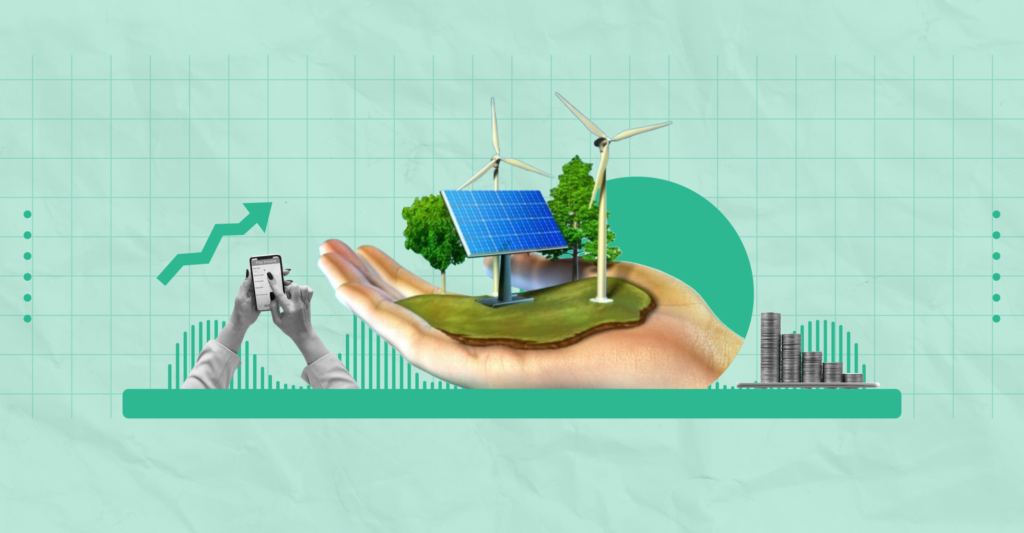Last Updated on Mar 14, 2023 by Harshit Singh
With the country’s resources depleting alarmingly, the Indian government initiated new alternatives to reduce dependency on fossil fuels and other non-renewable sources. As a result, new energy initiatives are introduced and adopted by the government to keep the country running.
The emergence of green and renewable energy companies alerted many investors to keep an eye on green energy stocks and renewable energy stocks, as these sectors are set to play a significant role in the country’s economy.
Moreover, according to IMF report, India’s economy is expected to grow at an average rate of 6%, partially due to the indulgence of energy companies in the future roadmap. Therefore, it puts both the energy stocks – green energy stocks and renewable energy stocks, as the ‘hottest’ sectors to invest in among investors in 2023.
But what exactly are these energy sources in question?
Table of Contents
What is green energy?
Green energy refers to the energy produced from renewable and sustainable sources that have a minimal environmental impact. It is often called clean energy as it does not emit harmful pollutants like greenhouse gasses or toxic substances.
The sources of green energy include:
- Solar energy: Energy obtained from the sun
- Wind energy: Energy obtained from the wind through wind turbines
- Hydro energy: Energy obtained from flowing water or falling water
- Geothermal energy: Energy obtained from the heat of the earth’s core
- Tidal energy: Energy obtained from the movement of tides in the ocean.
What is renewable energy?
Renewable energy is a source of energy that can be replaced or replenished relatively quickly. Renewable energy is typically generated from non-renewable sources, such as fossil fuels.
Difference between green energy and renewable energy
There needs to be more clarity when it comes to the difference between green energy and renewable energy. Many people believe that green and renewable energy are the same, but the two have some key differences. Here’s a look at the main differences between green energy and renewable energy:
1. Green energy refers to the energy that is generated in an environmentally friendly way. This means that the generation of green energy has a minimal environmental impact. Renewable energy, on the other hand, refers to any source of energy that can be replenished or renewed.
2. Green energy is usually derived from natural solar, wind, or water sources. Renewable energy can come from natural and artificial sources, such as nuclear power.
3. Green energy is considered more sustainable than renewable energy because it can be generated indefinitely without damaging the environment. Renewable energy is also sustainable but may have a more significant environmental impact if not managed properly.
5. Green energy tends to have a lower carbon footprint and generate less pollution and greenhouse gasses during production than renewable energy.
India’s green goal by 2030
While addressing the “Green Growth” webinar, the Indian Prime Minister said, “India’s potential in solar, wind, and biogas is no less than a goldmine or an oil field.” With India aiming to reach a total renewable energy capacity of 500 GW by 2030, investors view the green sector as a goldmine for their portfolio.
Now that you have a basic understanding of both green and renewable energy, here is the list of top-performing green energy stocks and renewable energy stocks in 2023 that you should add to your ‘Watchlist’ –
Best green energy stocks in India (2023)
| Name | Market Cap (Rs. in cr.) | Close Price | 1Y Return (%) | 5Y Avg Return on Investment (%) |
| Zodiac Energy Ltd | 147.58 | 100.85 | 41.84 | 13.36 |
| KP Energy Ltd | 360.7 | 329.15 | 26.99 | 12.71 |
| Websol Energy System Ltd | 309.99 | 78.80 | 24.81 | 6.94 |
| NTPC Ltd | 1,65,619.06 | 172.60 | 30.66 | 6.74 |
| Adani Green Energy Ltd | 84,745.74 | 561.75 | -71.21 | 5.62 |
The data is as of 3rd March 2022. The above list of green energy stocks in India has provided investors with the best ‘5Y Avg Return on Investment.’
Best renewable energy stocks in India (2023)
| Name | Market Cap (Rs. in cr.) | Close price | 1Y Return (%) | 5Y Avg Return on Investment (%) |
| NHPC Ltd | 40,330.81 | 39.804 | 35.84 | 6.55 |
| SJVN Ltd | 12,536.05 | 32.50 | 12.07 | 10.60 |
| KPI Global Infrastructure Ltd | 1,586.10 | 439.15 | 110.62 | 10.43 |
| JSW Energy Ltd | 37,538.63 | 242.65 | -28.07 | 8.41 |
| Sterling and Wilson Renewable Energy Ltd | 5,599.75 | 301.30 | -5.84 | 19.21 |
The data is as of 3rd March 2022. The above list of renewable green energy stocks in India has provided investors with the best ‘5Y Avg Return on Investment.’
Conclusion
In conclusion, the importance of green and renewable energy will increase as India transitions towards a more sustainable future. This shift in focus towards renewable energy sources has led to increased investment in green energy and renewable energy companies from foreign investors.
Overall, the future of green and renewable energy companies looks very promising. With costs falling and technology advancing, renewables can only eventually replace fossil fuels partially. This would be a massive win for the environment, the company, and the economy.
FAQs
What are green energy companies?
Green energy companies in India are those that generate renewable energy, such as solar, wind, hydro, biomass, and geothermal power. These companies are committed to reducing carbon emissions, promoting sustainable development, and providing clean energy solutions to consumers. Examples of green energy companies in India include Tata Power Solar, Suzlon Energy, etc.
What are some renowned renewable energy companies in India?
Some renowned renewable energy companies in India include Adani Green Energy, Azure Power, and Greenko Energy Holdings.
Which is the best solar company listed on the Indian stock exchange?
The list of best solar companies listed on the Indian stock exchange are as follows –
Waa Solar Ltd
Synergy Green Industries Ltd
Ujaas Energy Ltd
Surana Solar Ltd
Suzlon Energy Ltd
- Credit Limit Overutilised - Sep 9, 2025
- Best Gold Companies in India (2025) - Jun 5, 2025
- Top Adani Group Stocks in India (2025) - Jun 4, 2025





